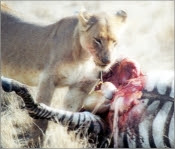question of the moment
 I confess I know little about political theory and just as much about economics. Want proof?
I confess I know little about political theory and just as much about economics. Want proof?I'm a pastor....
Anyways, theologians are famously concerned with "natural law" as a kind of primal, first-things law from which other laws and rules are derived: they are in some way accessible to all people and so they are a reference point to judge all the laws we create with, a legal trump card. So, to play with American history as an example, when Christians of good conscience worked to overthrow slavery in the U.S., which was legal, appeals were made to "God- given inaliable rights," those things rudimentary to existence. And really, who could question that? Of course, the other side thought it was their right to own people, too...
The problem, it seems, is that no part of nature seems ethical. Oh, sure, there are symbiotic animal relationships just like there are groups that care for other humans. But,"...Nature, red in tooth and claw" (Tennyson - you should know that quote. It is only one anyone can ever mention in this discussion. Say it and look smart at all your cocktail parties) is by and large completely indifferent to the sufferings of any life form. Nature is a giant competition for resources in a chaotic world, even when things form alliances. The bacteria in your stomach don't actually like you, they just like feasting on all the junk you cram down your throat. And so humanity is in a funny position: bound to live in a ruthless and beautiful natural world that we dare not imitate.
It is tempting for me, in the beginning of California's long-dark-night-of-the recession, to see capitalism as natural law at work. I suspect that philosophers have reasoned so already long ago, perhaps even to justify capitalism as a "natural" way to live life - the way things should be. Capitalism is survival of the fittest whether it's elephantine corporations or the predatory evangelism of "giving units." Survival is always economic.

So if capitalism is nothing more than natural law at work, maybe considering how we live in a fallen natural world can teach us how to live within a fallen capitalist one. (Perhaps that's a redundant phrase.) I mean, just as there is no way out of the natural world, there doesn't seem to be anyway out of capitalism entirely, either. Sure, I could become a hermit, but I am still at the very least permitting capitalism to continue. I could be communist, but it doesn't really seem to work- maybe it could, I dunno, but thus far no one has proffered up their republic to let me have a shot. And so we are all capitalists in a very general sense of the word. It seems to be the fallen created order of things: one giant struggle to find enough resources to reproduce and carry one, be it vegetable, animal, or human. Our consumption always comes at the expense of something else. (? kind of - does it?) Perhaps the ways we are human though animal, can teach us how to responsibly manage our capitalism.
How can I be renewed in a transformed mind, unfettered by the demands of a capitalist world (work harder, buy insurance, fear destruction, sacrifice the weak for the greater good, buy low, sell high, judge success by appearance or assets: ignore the homeless they deserve it, you should have more than others, consume all you can)? The answer lies somewhere in learning to become human, not just animal. The things we do, economically, to give generously, freely -quite apart from the best financial planning- may be the things that make us human, help us rise above our animal nature and not play by the rules of capitalism/natural law.
Obeying all of Christ's commands to give generously, though it feels like loss, actually gives us our humanity. It restores our souls. The commands free us to be as human as he was. So unlike the natural symbiotic relationship we have with the bacteria in our guts, we have the transcendent, glorious possibility of inviting people to a feast who cannot repay us: there is no natural reward to this, (selfish gene withstanding), and it's only result is to make us more human, more like Jesus himself, more who we were created to be. I guess I wonder if it is a way to see economies as more than a zero sum game. Is it right to see economies and markets (globally and locally, I might add) as gardens of savage beauty that responsible moral agents must not be controlled by, but instead have dominion over so that people might flourish, because like nature, there is no way out?
What do you think?


Comments
Post a Comment
I cherish your comments, but not vileness or wickedness. By vileness I mean Spam, and wickedness I mean hateful speech. Unless it's about spam.